SUMMARY
This is AI generated summarization, which may have errors. For context, always refer to the full article.
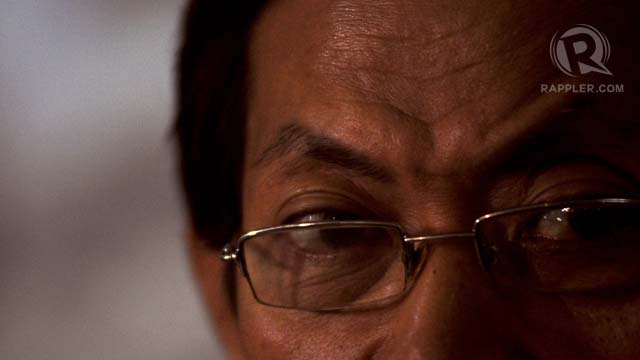
(Editor’s Note: First published in 2013, we are republishing this close to 5 years later. retired Major General Jovito Palparan was found guilty in September 2018, of kidnapping and serious illegal detention by Judge Alexander Tamayo of Malolos Regional Trial Court Branch 15.)
On December 20, 2011, five years after University of the Philippines students Sherlyn Cadapan and Karen Empeño were abducted from Hagonoy, Bulacan, the Bulacan courts released a warrant for the arrest of retired Maj Gen Jovito Palparan Jr.
The former party list congressman, along with 3 others, was charged with two counts of abduction and serious illegal detention.
Witnesses Raymond Manalo and Oscar Leuterio, both of whom were held captive for months in the cages of Fort Magsaysay, described the rape and torture of the two girls that occurred with the blessing of the man they first knew as “Grandfather.”
Reports from the United Nations, Human Rights Watch and the government-appointed Melo Commission note a sizable rise in the numbers of murdered activists and alleged communists in each area Palparan was assigned.
Under the administration of Gloria Macapagal-Arroyo, Palparan was promoted twice in the space of a few short months.
As a courtesy to the former congressman, the Aquino government immediately requested for Palparan’s surrender. He refused, and announced he would challenge the warrant.
At the time of this writing, 6 years and two months after the disappearance of Cadapan and Empeño, witnesses against Jovito Palparan remain in hiding.
Palparan is at large.
His bounty is set at P2 million.
RAYMOND MANALO
I was abducted at noon on Valentine’s day. I was 22 years old, and I begged them not to take me.
I come from a family of farmers. It was all I ever wanted to be. I was asleep when they barged into my room. One of the soldiers hit me with the butt of his gun. There were 6 of them, some I recognized as members of the local militia. They tied my wrists together and dragged my head back by the hair.
I started calling for my mother. I told her not to let them take me. She tried to follow but they pressed a gun to her head. They took my brother Reynaldo too. They said he was a rebel, like my brother Bestre who ran away years ago.
We were blindfolded and thrown into the back of an L300. They tied us to the benches and began beating us. The soldiers said that we would be brought to a place where we’d find out if we were real men.
That night, they began beating Reynaldo. I was locked inside a small room, but I could hear him screaming. I didn’t care. I knew I was next.
I heard Reynaldo admitting to everything they asked him. He said he was a member of the New People’s Army. He said he was a killer. Yes, he had killed many, so many men. Yes, ten! Ten men. Yes, I killed them, killed them all. Please, stop.
They led me outside after they were done with him. First there were the chains. They whipped my back, my buttocks, slammed them against the backs of my knees. My back gave way, then my knees. I tried to scream, but they were pumping water from a hose into my nose. I thought I was going to drown.
They never stopped asking. Where is your brother? Where are your comrades? Where do you hide your arms? Who, where, when? Yes, I said, yes.
They kept us in that room for days. My ankles were chained together. My wrists were cuffed. There was another chain running from my wrists to my ankles. We walked like monkeys, and pissed like monkeys, and we couldn’t wipe ourselves when the piss spilled from the Coke bottles they left for us.
One night, there was a man who came in and he said we had no right to be alive, that we should have been killed long ago. He had his combat boot shoved against my neck. He took the bottle of piss and poured it over my head, and then poured boiling water, then a bucket of cold water. When he got tired of beating me he started with Reynaldo. My brother’s head was bleeding. The man said he would kill us.
I ran away, crawled through a small window with half my cuffs still locked. I left my brother behind. I kept going until I saw a firing range, buildings, a school. I stopped and asked for directions. The old man told me where I was. Palayan City, Fort Magsaysay, under the jurisdiction of the Armed Forces of the Philippines.
They had to burn through a forest to catch me. The men poured gasoline on me when they hauled me out of my hole. Someone called, said they weren’t done with me. So they brought me to a different place, to a house with 4 cells and men stuffed into them like pigs.
OSCAR LEUTERIO
They took 4 of us from the mining site where I worked as a security guard. It was past 10 in the morning. There were maybe 30 of them from the 56th Infantry Battalion. They began to beat us, kick us, and hit us with the butts of M16s and M14s. They asked who we were, and where the NPAs were.
They put us inside a truck. We entered Camp Tecson around 10 pm. They brought us to what I think was the back of the camp, and put us inside a small hut. There was a man inside. He was wearing a yellow T-shirt and denim pants and he was drunk.
He began walloping my head with a 3-foot slab of wood. My head burst. He pounded on my toes and fingers. They burst. He clouted me on the legs and knees. It was when he hit me again in the head that I fainted.
The next day they put us back in the truck and drove us to a house in Fort Magsaysay. There were cells, 4 in a row. The floor of each cell was 5 feet long and 3 feet wide, the walls 5 feet high. There was a toilet made from a hollow block in the corner.
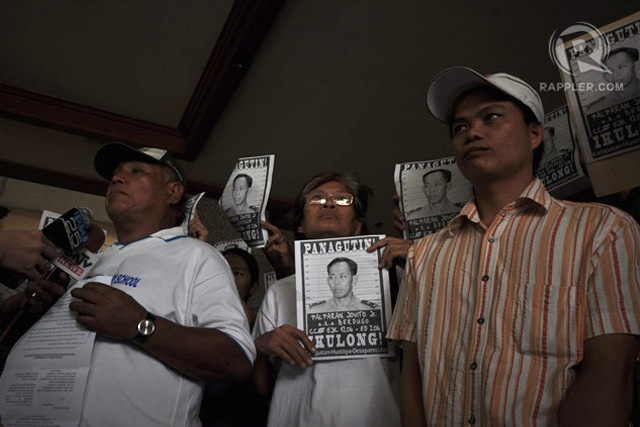
They gave us time to heal and began torturing us on the 7th day.
They kept asking me where our guns were hidden. They asked us who was armed. I kept saying I didn’t know anything. We were in those cells for months.
A man in the next cell couldn’t take it. The soldiers found him one morning, hanging from a noose he made using the doubled garter from his underwear.
There was a woman too, Teresa, and she kept begging.
I can’t take any more, she screamed. I am in pain. Stop, I am in pain, I’m going to shit, stop.
MANALO
I sat with 3 other men in the cell for 3 months. We were crouched in a line. It was the only way we could fit.
The soldiers brought in two men and a married couple. The woman had burns all over her body. Oscar said her name was Teresa, that she was raped. She was raped and beaten until she shit on herself. She had already lost her mind when they took her away.
This is where we shit, where we pissed, where we washed when we could. We never saw the sun; we never felt the wind. They gave us leftover pig slop once in a while, and that was all.
Sometimes, when the soldiers were drinking, they would take us out of the cage to play. The game changes, but it’s usually the same. Two by fours, chains, maybe an open gardening hose shoved down your nose. I would crawl back to the cage after, on my hands and knees.
Sometimes, some of us would disappear. Sometimes they didn’t come back.
OSCAR LEUTERIO
The soldiers were drinking one night when I heard them say that two pretty girls had been captured. They wanted to make the girls dance. One of them said the two should make good fucks.
I saw the girls pass by the door of my cell. They were blindfolded, and one of them was tall, and her teeth stuck out in front.
I could hear them beating up a man outside. They called him MM. That’s what we called an old friend of mine. MM, Manuel Merino.
JOLLIBEE
My name is Wilfredo Ramos Jr, but they call me Jollibee because my mother had me 19 years ago in the first Jollibee fast food restaurant they opened in Bulacan.
I was 14 when it happened. The girls were staying with us, researching the farmers in Hagonoy. I don’t think they were rebels. Activists maybe. I knew them for years. They were almost family.
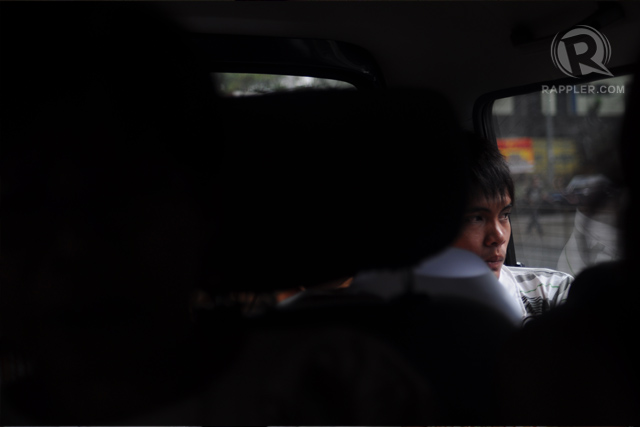
The men came at two in the morning. There were 15 of them, from the armed forces. They knocked on our door. They said if we didn’t let them in they would shoot us down. My father opened the door fast, but they bloodied him anyway, hit him behind the neck and tied him down.
I followed my father down the stairs. The soldiers saw me, clouted me, and then tied me too.
That’s when I heard the girls screaming for help. They were being forced out of our house and beaten. One of the farmers who lived with us, Manuel Merino, ran out to help Karen and Sherlyn. They took him too.
I don’t know how old he was. Maybe in his 70s.
MANALO
They moved us from camp to camp. Military officials began interrogating me. I knew they were officers because the soldiers who beat us up called the interrogators “sir.”
They would blindfold me, but I saw their faces when they arrived. They wore uniforms different from the soldiers.
There was a man who came with General Palparan, and he said my parents had filed a habeas corpus case when Reynaldo and I disappeared.
The soldiers took me away. There was a doctor, pills, antibiotics, a bed. They told me they were bringing me to the Grandfather.
I met him then, Maj Gen Jovito Palparan.
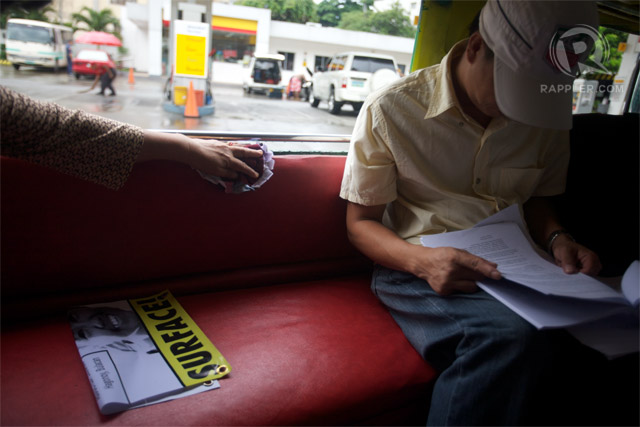
He told me to stop trying to run away. He said next time he wouldn’t let us live. He promised that if we tried to escape, my brother and I, he would massacre my whole family until even my cousins were dead. He told me I would be allowed to visit my family. He said to tell my parents not to join the rallies, not to file cases, to stay away from human rights groups, that they would ruin my life and my brother’s. He was wearing shorts and sandals and he was nice, and he said that if I could only prove I was on his side, he would let me and my brother live.
He gave me a box of vitamins, and told me they were expensive: P35 per pill.
They put a chain around my waist. The military surrounded our farm. My mother opened the front door crying, and I tell her what I’m supposed to say. I give her an envelope of money that General Palparan said I should give. Then we leave.
There were orders to pick up a pair of UP students. I didn’t know who they were. Like me, they were brought to Palparan.
MAJOR GENERAL JOVITO PALAPARAN JR.
I heard about the 3 missing persons in Hagonoy, Bulacan, but they were real NPAs, who have dominated the area for more than 5 years, terrorizing, collecting from the fish pond owners, organizing the people and resorting to violence.
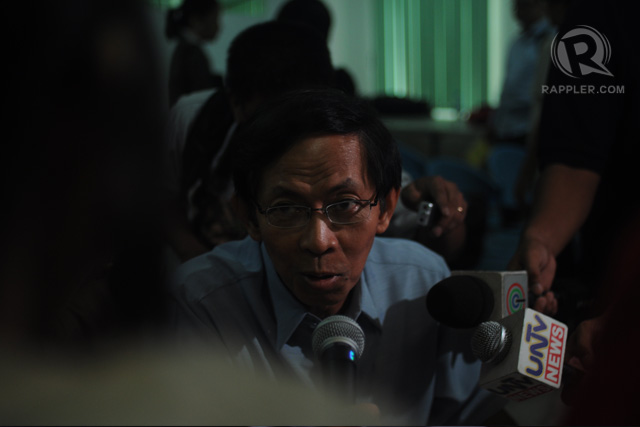
I am told they are called Ka Tanya and Ka Lisa, but I did not get the name of the man.
MANALO
I kept thinking of escape. They took us to Camp Tecson, under the control of the 24th Infantry Battalion. I made myself useful, so they would trust me. I cooked, washed their cars, fed their animals, did the laundry.
I was sweeping the floor one day when I saw a girl chained alone to the foot of a bed. At first I wasn’t allowed to talk to her.
When I finally did, she said they would take off her chains during the day, so she could do the soldiers’ laundry. She said her name was Sherlyn, that she was from Laguna. She said they tortured her the moment they took her and Karen from Hagonoy.
She said it was Jovito Palparan who came to torture her. He hit her on the mouth, she said, until she bled. He punched her breasts and her stomach. He slammed planks of wood against her. She bled everywhere. He told her to admit she was a member of the NPA.
She was crying while she told me. She said she wanted to go home to her parents.
I met Karen and Manuel later. The 5 of us – the girls, Manuel, myself and my brother were taken from camp to camp, cooking and washing and cleaning for the soldiers. I saw the soldiers steal from villagers. I saw them bring in blindfolded prisoners. I saw them digging graves. I saw them burn bodies, pour gasoline on them. Once, I saw them shoot an old man sitting on a carabao.
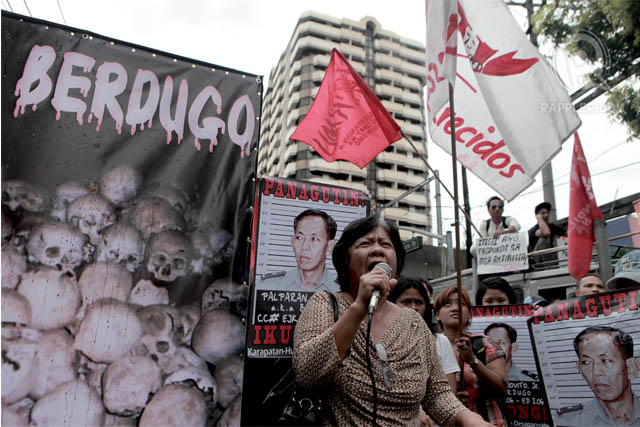
In April 2007, I saw Sherlyn lying naked on a chair that had fallen on the floor, her wrists tied together, one leg tied down.
I saw them hit her with wooden planks, saw her electrocuted, beaten, half-drowned. They were playing with her body, poking sticks into her vagina, shoving a water hose into her nose and mouth. I heard the soldiers force Sherlyn to admit whom it was with plans to “write a letter.” She said it was Karen’s idea. They dragged Karen out of her cell, stripped her, tied her at the wrists and ankles. She was beaten, water-tortured, burned with cigarettes and raped with pieces of wood.
I was ordered to wash their clothes the next day. There was blood in their panties, and chunks of blood in their bucket of piss.
I was there when they killed Manuel Merino.
They took him away, and I followed. I heard him begging and moaning. There was a gunshot. Then there was a fire.
OSCAR LEUTERIO
Three weeks before I was released, I was blindfolded and led to speak to the man the soldiers called Grandfather. He told me that they would let me live for as long as I helped them.
I was released in September. They told me to stay home, not to speak to anyone until they gave me further instructions. I did not follow orders.
RAYMOND MANALO
When I escaped, I promised myself I wouldn’t hide. They can take me, they can torture me, they can kill me slowly. I swore they wouldn’t take me alive.
GLORIA MACAPAGAL ARROYO
In the provinces under the control of the Armed Forces’ Seventh Division, Jovito Palparan continues to battle our enemies. He will not back down until the communities he serves are released from the darkness of fear, able to rebuild their lives in the dawn of justice and freedom. (From her 2005 State of the Nation Address)
JOVITO PALPARAN JR
I did not plan to be a soldier. I wanted to be a lawyer. I admired lawyers who became politicians. Maybe at that time I already had a liking of leadership, because I appreciated this one powerful politician when I was in Leyte with my grandmother. He was in his youth, I think, he was campaigning in our barrio, and he had followers. He was in charge, you know, and people listened to him. So as a young, very young boy, Grade 1, Grade 2, 6, 7, I just thought that he was decent, and yet he was very friendly. People listened to him, you know.
That’s one thing. People listened to him. You want to be listened to; you want to be heard. That’s why I admired him. I thought that, yes, I think I want to be a lawyer. Maybe I thought of politics, but it did not come easily to my mind. As a young boy, you just appreciate, admire some people. Not necessarily the career. The person. How he carries himself. How you see him and you’re already impressed.
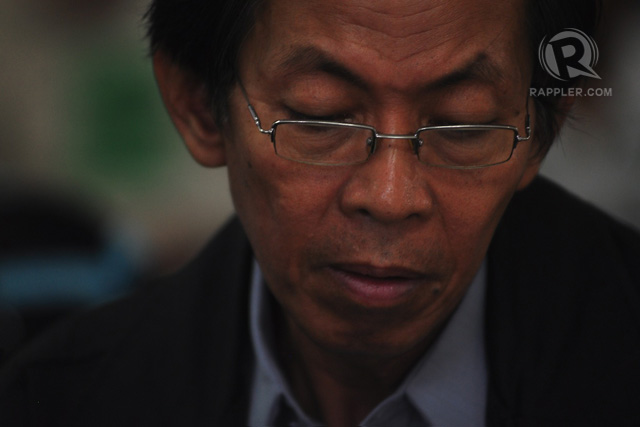
My mother said that if you want to go into law, then you take another course that you can make use of if you don’t finish law. I took up accounting. It was a very lonely course; you’re counting figures. I took up ROTC, joined the reserved officers training, to have a diversion from my studies. For young people, you have to have some group. Instead of fraternities, for me it was the ROTC.
Initially I was a model cadet in the ROTC. I enjoyed that because you know, when you’re young, you like ceremonies. As a model cadet you have to follow orders very seriously. You have to, because in order to be a leader, you have to be a good follower. I wanted to become an ROTC officer so I knew I should be a good follower. Maybe I was 18.
I found out that I had some leadership skills, traits. And so I tried to be good at that. I could talk to a number of people and they would listen, you know, and do what I wanted, do what I desired. My leadership was more inspirational. I like to inspire people, instead of forcing people to do something. Because there were those whose leadership was strict, dictatorial, authoritative. I didn’t like that. I opted to be inspirational or persuasive.
If you are good to them, you’ll have a lot of people volunteering to come into your company and leaving others. And so, upon finding that skill – and people seemed to like you with that – I proceeded to become an officer.
As a leader or a commander, you have a group of people that would be under your control somehow. On times that you have to get together, you have to have control of them. They have to follow you, listen to you, implement what you want. I found out that when you enforce something, they will do it because you have some sanction and you can punish them if they don’t follow.
But if you do it that way, there will always be some reaction, and you can hear about that from others. They will say, “This is too hard,” maybe begin questioning things. The next time, they will avoid you already. If you are a commander of this unit, some of your men would just choose other units. But if you are good to them, you have a lot of people volunteering to come into your company, and then leaving others.
First you establish your relationship with friendly gestures. And then you lay down your policy. Then of course they would start behaving sometimes quite indifferently because when you set a policy, when you set rules, usually there is resistance. It’s normal, because people don’t want to be tied up, you know. They don’t want to be told, you know.
So there will be reactions. So you remove the threat by your gesture of being friendly. And so, it is easy for them to follow you because they don’t want to break your relationship. In that way you are inspirational. They don’t want to offend you, because you are a friend. It’s a pre-emptive move. Even if they don’t want what you’re saying, because you are a friend, they don’t want to oppose. But they will tell you anyway what is not good for them. And if they see that you are listening, if you are open to suggestion, then the more you’ll develop your leadership of them.
That’s what I learned when I was still at ROTC. It is what I have applied, very much.
I will tell you what made me join the military. I was undergoing training for my commission as a reserve force. It was all I wanted. But because I was an ROTC graduate, I just needed to formalize my completion of a rank. The armed rebellion of Mindanao, I think, exploded in 1973. That was why I was recruited to join the regular force.
When you already side with the government, then the military is a very, let’s say, is a good option. I believed I needed to fight against the aggression of the rebels, especially in Mindanao because I’m from Mindanao. I was already in the military when martial law was declared. I finished my training already in May, June, July, December, October, October, October – I think during martial law I was undergoing training.
Even before Gloria Macapagal Arroyo became president, I was already running after the New People’s Army.
Communism, being already a discredited ideology and a violent ideology, has got to vanish. It should not exist. It should not exist. Meaning it was wrong to conceptualize that ideology. It’s really a monstrous and bad idea. But you cannot blame those who created it also because they thought, at that time, that it was the best way to govern people. But it turned out into a really monstrous and bad ideology, killed a lot of people, destroyed a lot of institutions and properties.
All the variations, they’re all the same, you know. The difference is only in the people implementing the ideology. The ones who were very, very serious – taking lives and promoting revolution was their method of implementing their ideology. And a revolution means killing and so that’s what I don’t like.
I do not like it. The whole of it. The violence as well as the government system.
For officers it is almost automatic. You are given your platoon command, people, a set of people that you can lead and do a mission. I believe I inspired them. I cannot order my soldiers to kill, it’s their judgment call, they can do it on their own.
I encourage people victimized by communist rebels to get even. The killings are being attributed to me. But I did not kill them, I just inspire the triggermen.
It’s easy to distinguish a communist. You can tell by their body language. You have to be discriminating, you have to assess the individual. Maybe he believes that he cannot be involved, that he doesn’t like communism, he’s just trying to be a catalyst for change. But he could be eaten by the system he joins in. Meaning you really cannot be neutral, you cannot really be moderate.
All moderates will become communist. Once you’re there, you are, you can, you have to be, eventually you have to be involved. Your belief is not, but you are, you can be involved in all their activities already. Your pronouncement may not be that radical, may not be extreme but, if you are there, how can you fight the system if you are part of it already?
Even though they are in government as party list representatives, no matter what appearance they take, they are still enemies of the state. The party list members of Congress are doing things to further the revolution, the communist movement. I don’t remember what they did, there are so many. They did many things. Like trying to cancel the ROTC.
I wish they were not there.
I ran for the Senate and still intend to run for government to act as a counter-force against these people. They are terrorists. It is my belief that these members of the party list in Congress are providing they can had day-to-day policies of the rebel movement.
I want communism totally erased. To wage the ongoing counterinsurgency means neutralizing not just armed rebels, but also a web of alleged front organizations that include leftist political parties, human rights and women’s organizations, even lawyers and members of the clergy.
Those who claim to be for labor, for press freedom, I would like to say that these are deceptions.
I personally think I succeeded in my military career. I contributed to the country. I was successful, but I feel that I ran out of time. If I had more time, I could have done more. – Rappler.com
Portions of the above narrative were originally written for Esquire Magazine, UNO Magazine and the Philippine Daily Inquirer. These are all based on multiple personal interviews with all the characters involved (with the exception of former President Macapagal Arroyo), sworn court statements, as well as from various media interviews quoted in the 2007 Melo Report by the Independent Commission to Address Media and Activist killings created under Administrative Order No. 157.
Add a comment
How does this make you feel?
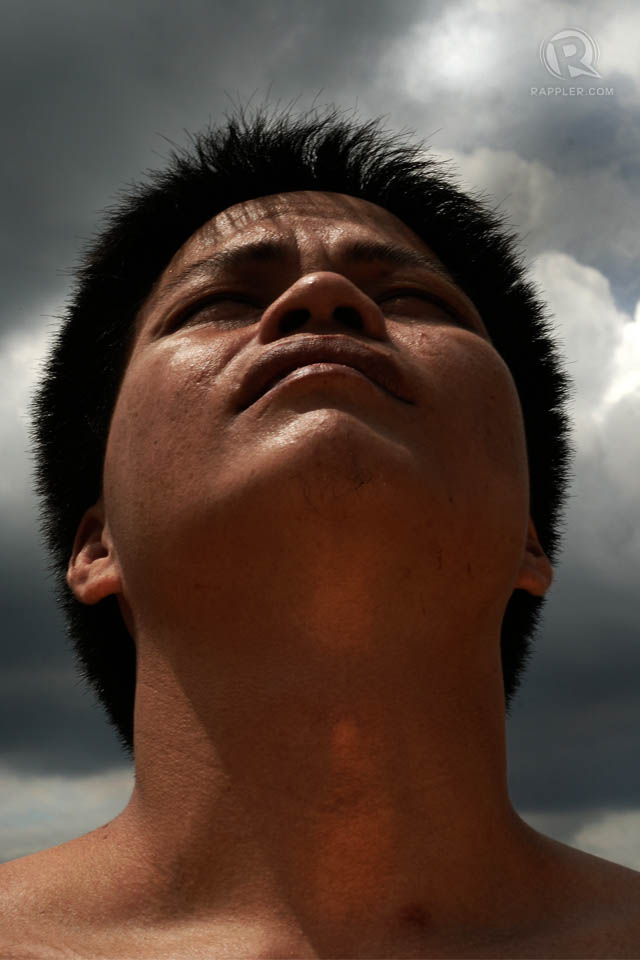
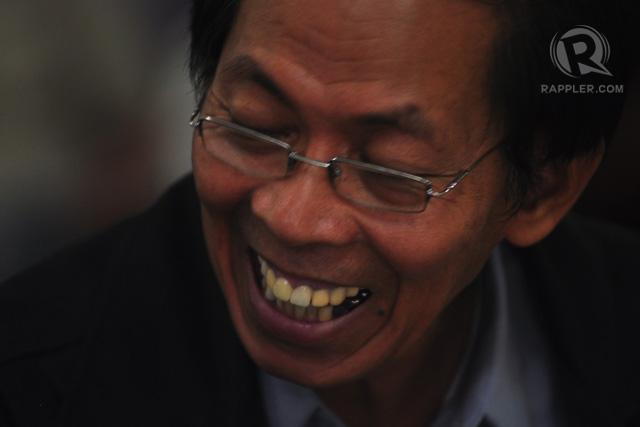
There are no comments yet. Add your comment to start the conversation.